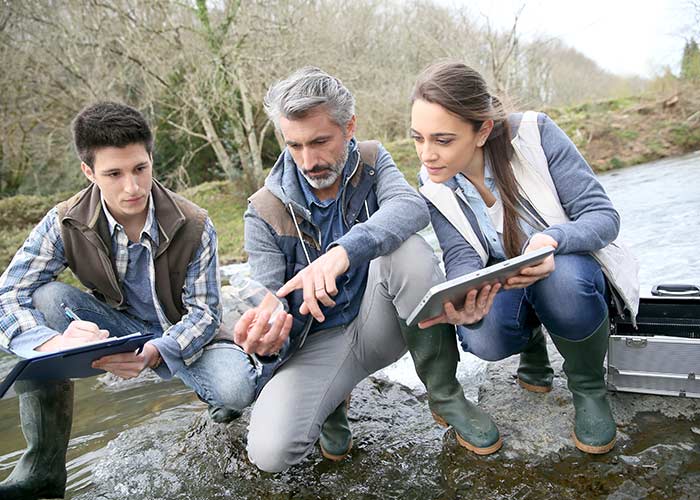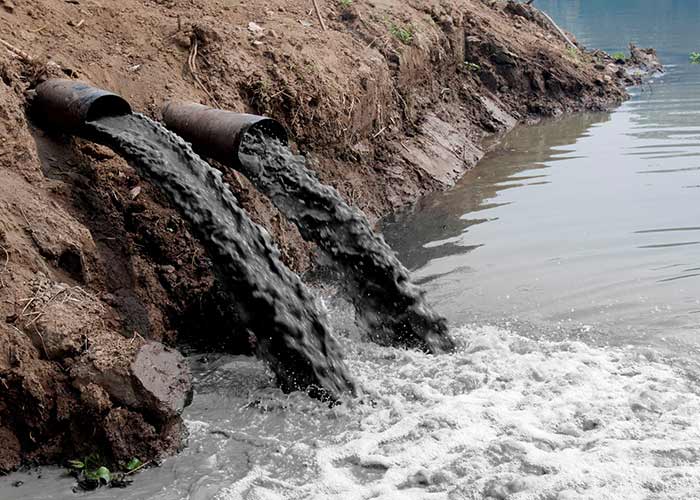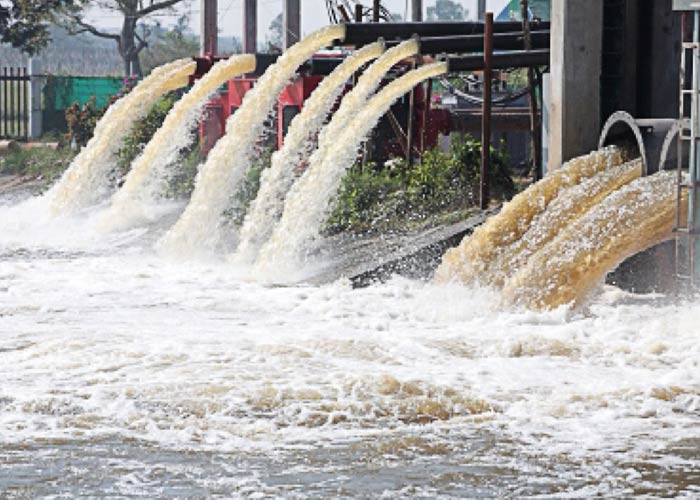Water is the basis of the life of all living beings. With the development of modern human civilization, the problem of water pollution has become a serious issue. There is a growing trend of industrialization and urbanization. The villages are fast being transformed into cities and urban clusters with the establishment of various industries in and around, leading to over-exploitation and contamination of water resources. Initially, when various technologies were not developed, the people used to live in the lap of the nature, but with the fast paced development and emergence of industrialization, water pollution has assumed alarming proportions.
Due to rapidly growing population, construction of flats on mass scale is a growing trend in the cities to accommodate the rising population, as in a flat a family of three to six people can live easily. However, in these flats the need of water is high and there is growing pressure on groundwater reserves. Unchecked borings and the consequent excessive pumping in coastal areas can cause saltwater to move inland and upward, leading to contamination of the water supply.
Steps to prevent water pollution / Ways to reduce water pollution
Highly contaminated water coming out from the industries and their leftover chemical residues, etc are also discharged into the river through drains. Waste generated, due to daily activities of the people living in the houses, are also thrown into the rivers which leaves the river’s water highly polluted. If we have to control water pollution, we will have to find out a way out, and devise laws and strategies.
Enforcing Laws to Prevent Water Pollution
We should strictly follow all the laws regarding water pollution
The legislative provisions, such as the Water Act 1974 and Control of Pollution Prevention and Environmental Protection Act 1986 are there but these have not been implemented effectively and so we will have to get these implemented strictly for effective prevention of water pollution. Water Cess Act 1977 is another important law which aims to reduce and prevent water pollution; however, its effects have been limited. Apart from the laws, creating awareness about the impacts of water pollution is required. Through public awareness and effective implementation of established laws, water pollution can be reduced very effectively.
Industries should behave more responsibly
Many industries directly flow their waste everywhere which reaches rivers through rain water. To prevent water pollution from industrial wastes, it is required that these wastes should be disposed of properly. Some industries follow this rule, and they either destroy the remaining material, or re-use it safely. In addition to applying these methods, industries are required to bring about changes into their methods of manufacturing to prevent water pollution. But not all the industries are following these norms. Most of them throw their wastes into the rivers which is a dangerous scenario as far as water pollution is concerned, as all these wastes finally affected the water animals as well as the humans.
Avoiding hazardous material
It is also extremely important to adopt the correct methods of the disposal of toxic wastes. In the places where paints, cleaning and stain removal chemicals are used, it is required to arrange for the safe disposal of the wastes and the contaminated water coming out of these factories. Oil spill from cars, other vehicles and the machines are required to be stopped completely.
Oil leak from the cars and other machines have posed bigger threat and these have become major contributors for water pollution. So, it is important to take care of cars and machines. Oil leak from the factories are also required to be stopped after the completion of the work in factories. These factories are required to apply all the ways for the safe disposal and clearance of the oil.
Cleaning of drains
To prevent water pollution, the drains are required to be cleaned on a regular basis. In the rural areas, pucca drains are required to be made, because the water is going everywhere in a chaotic manner; it finally reaches the rivers and canals with tons of garbage and pollutants. We should develop a technology to keep the drains away from the water sources.
Recycling and Reuse of water
Re-cycling and re-use are other ways to prevent water pollution which can improve the availability of fresh water. The use of low quality water, such as treated wastewater in the industries and for washing utensils and gardening makes the fresh water less contaminated. Such water can also be used for washing vehicles and we should use only good quality water for drinking purposes. Currently, water recycling is being only in a limited manner. So, we will have to stress more on proper recycling and reuse of water to prevent water pollution.
Preventing soil erosion
To prevent water from getting polluted, we are also required to prevent soil erosion. If there is soil conservation, we can stop water pollution up to some extent. We will have to plant more trees to stop soil erosion. We must adopt such methods which can cultivate the soil and improve the health of the environment.
Making Swachh Bharat Abhiyan a success
There is need to implement Swachh Bharat Abhiyan in totality and make India open defecation free. Presently, the problem of open defecation and the dumping of garbage in public places still continue. When it rains, all the dirt, garbage and excreta get into streams or ponds, polluting water sources. Otherwise too, people themselves flow waste materials into rivers or ponds in the absence of proper drainage system. Ponds and rivers are also used for bathing and washing purposes due to which huge quantity of dirt and pollutants get accumulated into the water bodies. Moreover, due to these activities, garbage, excreta, ashes of the dead old clothes and soiled materials are discharged into rivers and even sometimes dead bodies are also thrown into the rivers and water bodies. There are virtually no toilets in the slum settlements located near city-dwellings, or even if there is one, it is not able to function smoothly. This calls for practising good hygiene in the true spirit of Swachh Bharat.
Cleaning of water ways and the beaches
Cleaning is required on a regular basis as water of the rivers, ponds and even the groundwater has also been contaminated by humans. Even the humans have not spared the ocean water, making it polluted. Travel through sea, growing preferences for residing near sea shores has resulted into several small and big settlements near seas which has made the pollution of sea water a rising concern. For their livelihood many people are selling different contents to the tourists and they throw the residue at sea shores and thus the water of the sea become polluted.
The temporary settlements near the sea normally do not have toilets which is why these people defecate in the water of the ocean and the people also throw their household garbage in ocean waters. After cleaning up their mess the ships also throw their garbage into the water. Sometimes, accidents of the ships also takes place into the sea and thus various chemical substances and oil get spilled over the sea water leaving long term impact on the creatures living in water.
Due to contamination of water some organisms die immediately and make water more polluted. The consumption of these aquatic organisms living in polluted sea water also makes the humans go sick. Developed countries also throw their e-wastes and poisonous garbage into the sea and thus sea water gets badly contaminated.
Need for living in harmony with nature
Man has forgotten that his existence on this Earth is because of the nature and environment. The human negligence is also a major cause of environmental pollution. Various species and organisms of the water naturally die due to humans bathing in the water and thus making it polluted. Household wastes and industrial waste also add to the problem. It is time for learning sustainable ways of living.
Adopting organic farming
The farmers should stop using various chemical fertilizers in their fields to get a bumper harvest or spraying pesticides on their crops for this purpose. When it rains all chemicals goes into the ponds and rivers through rain water and thus water bodies get heavily polluted.
How to stop water pollution / how can we prevent water pollution?
Water pollution control methods at a glance:
- We should treat the poisonous substances and discharge materials and toxic substances coming out of the homes and factories before discharging them into the rivers and ponds.
- We should not mix petroleum substances in the water.
- There are some algae and water plants available which are helpful in keeping the water clean, they should be grown all over in the water.
- Garbage in the cities and towns should be classified and thrown into the designated dustbins only. The biodegradable garbage can be used as compost in the fields and thus these can help in the production of the crops.
- Dead bodies should not be thrown in the river.
- All cities and towns must have sewer facilities.
- Water should neither be abused nor be wasted.
- We should not put excreta and sewage flowing from cities and towns into water, but dump them in garbage pits outside the city so that they turn into compost later on and which can be used in the fields.
- We should not encourage the use of materials such as plastic as it does not destroy biologically.
- We should initiate scientific experiments that can put pollutants into useful items. For example, Roorkee-based Central Building Research Institute has successfully tried to transform the ash from the thermal power stations into bricks.
- In homes, water should be made germ-free by chlorine tablets, iodine, etc. Nowadays, there is a variety of good quality filters available in the market that should be used.
- Effective steps should be taken to outlaw dumping of wastes into a river or other water sources.
- The oxidation of organic materials should be done prior to their disposal.
- To destroy bacteria in the water, chemical substances such as bleaching powder, etc should be used.
- We should not tamper with public water distribution.
- Immersion of idols during religious ceremonies to be done at the appointed place only.
- Do not waste even a single drop of water.
- At the international level, there should be ban on nuclear tests in the ocean.
- Awareness should be created in society about the risk of water pollution.
- Pollutants can be converted into non toxic substances by treatment.
- The presence of radioactive wastes in the water can be removed by oxidation of ponds.
- One must avoid the large ponds as sunlight combined with organic nutrients may lead to the larger growth of bacteria which breed the waste matter.
- The reclaimed polluted water can be used in making fertilizers as it is rich in phosphorous, potassium and nitrogen. It can also be used for the irrigation and factories purposes.
- We should set more and more sewage treatment plans that play a crucial role in the reclaimed polluted water.
- Laws must be enforced to ensure that the industries do treatment of wastes before the water is discharged into the rivers and seas.
- We can plant water hyacinth which is also referred as kaloli to treat the polluted water. It deals with the biological and chemical waste. The heavy metals are also removed by it.
More on Water Pollution







